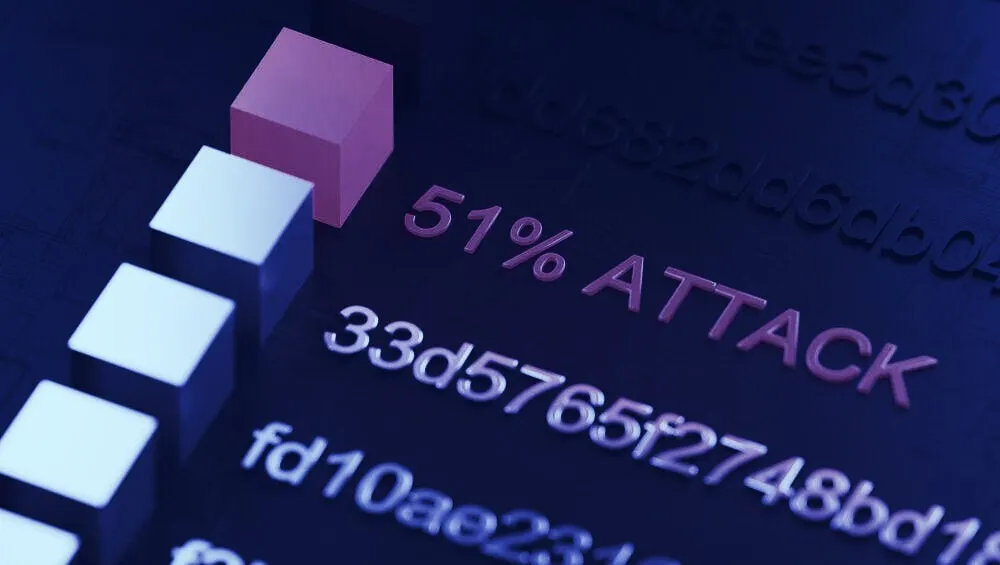In brief
- Voluntarism.dev, an anonymous group of ‘old-guard miners and whales’, launched a 51% attack on Bitcoin Cash ABC (BCHA).
- Invoking the non-aggression principle (NAP) to justify its attack, the group protests Bitcoin Cash’s contentious hard-fork following the 8% miner tax controversy.
- The attack modified the code so that it would tax miners 100%, instead of 8%, rendering the mining efforts worthless.
Editor's note: This article has been updated with comments from Bitcoin Cash developer Chris Troutner.
Voluntarism.dev, a self-described group of ‘old-guard miners and whales’, today launched a 51% attack on Bitcoin Cash ABC (BCHA) in protest over Bitcoin Cash’s contentious hard-fork on November 15.
The anonymous group modified ‘the coinbase rule’ so that mining Bitcoin Cash sends 100% of the block rewards to the address associated with the Infrastructure Funding Plan (IFP)—instead of the controversial IFP tax of 8% that led to the hard-fork. This would render mining for BCHA worthless for the miners.
A 51% attack refers to crypto attacks where malicious actors take over the majority (hence, 51%) of the network’s hashing rate and can single-handedly impose policies on the network.
Chris Troutner, a Bitcoin Cash developer close to BCHA, told Decrypt that the 100% block reward is just “a facetious joke”, far from an existential threat. “No one has any incentive to see that code merged into the production code.”
Troutner says the “attack” is just a code pull-request (PR) to the full node software, which Bitcoin ABC exclusively controls and the miners use to mine. “A miner is free to fork and change the software, but at no time can they make other miners run that software,” he told Decrypt.
The attack is two-fold. First, the attacker mine empty blocks to delay the confirmation for transactions. This does not require much hash power. Secondly, they flood the network with transactions. This does not require any hash power but costs BCHA.
“Either event on its own is not a serious issue, the Bitcoin Cash protocol will naturally fix it,” Troutner told Decrypt.
“But combined, they essentially create a DoS attack, making the network function poorly as a payments network. The unknown miner is doing this at great expense to themselves, so long-term, they can not sustain this attack.”
In early November, the Bitcoin Cash blockchain split into two: Bitcoin Cash Node (BCHN) and Bitcoin Cash ABC (BCHA). The split, or the hard-fork, followed the controversial coinbase rule, a proposed 8% tax on all miner profits proposed to go to a developer team. This was hugely unpopular with the users of Bitcoin Cash.
51% attacks are not rare in crypto. They are pricey, too. This summer, Ethereum Classic, a fork of the Ethereum blockchain, suffered three 51% attacks, which potentially cost the attacker $3,800 in rented hash power. In April, Decrypt reported that a one-hour 51% attack on Bitcoin Cash cost roughly $7,300, which at the time was equivalent to 1 BTC.
Voluntarism.dev is not daunted by the costs of launching these attacks, which it calculates is much less what ABC’s policy cost them.
Vitalik Buterin, the co-founder of Ethereum, thinks the intention is to single-handedly destroy the network.
Mining pool 51% attacks BCHA seemingly with the explicit goal of destroying it. Will this be the first true spawn camp attack on a PoW chain?
(See also: https://t.co/LJmZAYCtEG) https://t.co/QrLSi0ac7F
— vitalik.eth (@VitalikButerin) November 28, 2020
What separates this attack from earlier ones is how politically charged it is. In a tweet statement, the group justified its 51% attack on grounds that the “ABC violated the NAP.”
ABC violated the NAP with 9 months of civil war. freeriders must pay 100% of the block reward to ABC. we will orphan all blocks that do not. we will pay 100% as well, once ABC merges this change https://t.co/82rcZPWQ6N
— voluntarism.dev (@DevVoluntarism) November 27, 2020
Cladded with the libertarian Gadsden flag, the group invokes the libertarian axiom of the ‘non-aggression principle’ that supposedly prohibits any initiation of force or coercion.
Accordingly, the group claims, ABC initiated force against miners by introducing the coinbase rule that tax their profits at 8%.
This anti-tax sentiment on grounds of the NAP has long been part of the crypto movement: in 2019, for example, Bitcoin.com released an educational video on tax and the NAP. The video is presented by Roger Ver, a major proponent of Bitcoin Cash, sporting a voluntaryist flag t-shirt.
There is a striking resemblance between that 2019 video and the voluntarist.dev’s statement today, but there is no public indication that Roger Ver is part of the group behind today’s attack.
Troutner does not think Ver is behind this. “He's too convenient of a scapegoat,” he told Decrypt. “I don't think anyone knows who is really behind the attack, other than the attackers. [But] it doesn't matter. This time next year, the attack and the attacker will be forgotten.”
Even though the anti-tax stance on grounds of NAP has been adopted by the libertarian crypto enthusiasts and even manifested itself as the rationale behind today’s attack, the contemporary libertarian philosophers outside the crypto bubble dismiss the principle as question-begging.
Bitcoin Cash ABC’s price has not been adversely affected by the attack. On the contrary, it today hit $18.22 with an increase of 1.33% over the past 24 hours.
“I think the stability in the BCHA price [..] reflects the conviction of current BCHA holders,” Troutner told Decrypt. “At this point, it's really just a waiting game.
“Will the miner run out of money? Or will ABC implement post-consensus and put a stop to it? Either way, there is no long-term damage, other than to possibly weaken confidence. But the price is already so low, that Bitcoin ABC, and their supporters, can afford to wait for a long time.”





